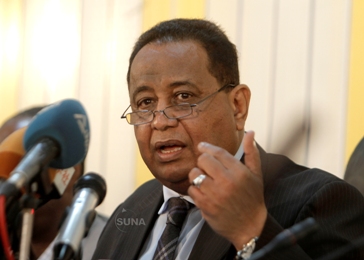Sudan expects U.S. Congress to denounce rebels’ rejection to sign peace roadmap
May 10, 2016 (KHARTOUM) – Sudan’s Foreign Minister Ibrahim Ghandour has expected that the United States Congress would ask the US Administration to condemn the Sudanese rebel groups for refusing to sign the Roadmap Agreement brokered by the African Union mediation.

However, the opposition groups, Justice and Equality Movement, National Umma Party (NUP), Sudan People’s Liberation Movement -North (SPLM-N), and Sudan Liberation Movement-Minni Minnawi (SLM-MM) refused the roadmap saying it acknowledges a government controlled dialogue conference and would lead to reproduce the regime.
Ghandour said the roadmap would end the war and bring stability to the conflict area, stressing the government continued to call for implementing the tripartite agreement on humanitarian access.
In February 2012, the United Nations, the African Union, and the Arab League jointly proposed a humanitarian access agreement, designed to provide critically needed food and medical deliveries in those areas controlled by the SPLM-N.
The two warring parties signed two agreements in February and August 2012 with the tripartite initiative, in order to provide humanitarian assistance to civilians in the war areas.
However, the two parties failed to implement the agreement as the government laid out operational conditions and asked to control the whole process even in the SPLM-N held areas.
But SPLM-N refused the entry of the government Humanitarian Aid Commission (HAC)’s workers in its areas, saying this body is infiltrated by security agents.
The Sudanese top diplomat further downplayed the letter signed by Members of Congress calling on the US President to tighten the sanctions imposed on Khartoum.
He said the letter was not signed by the majority of the legislators, claiming that only five members from the majority party signed the letter.
Last week, a group of 120 legislators called on President Obama to use his final months in office to “exercise leadership” on human rights abuses in Sudan.
They asked the president to use targeted financial measures against Sudanese leaders to force them to stop killing their citizens.
The legislators also urged Obama to persuade the “Arab world to use its influence with the Khartoum regime, and to press the gold industry to designate Sudan’s gold exports as conflict-affected”.
Ghandour pointed that the relationship with the US has reached the stage of the “joint understandings”, saying they would continue the dialogue to convince Washington that the sanctions imposed on Sudan are “unjust and oppressive and have nothing to do with human rights”.
Washington imposed economic and trade sanctions on Sudan in 1997 in response to its alleged connection to terror networks and human rights abuses. In 2007 it strengthened the embargo, citing abuses in Darfur which it labelled as genocide.
Since 2011, Sudanese Armed Forces is fighting the SPLM-N fighters in South Kordofan and Blue Nile. Some 12 rounds of talks between the government of Sudan and SPLM-N failed to achieve peace.
According to UN figures, 5.4 million people are in need of humanitarian assistance in Sudan. Despite the ongoing efforts to bring peace in western Sudan there are over 2.5 million displaced people in Darfur.
(ST)
